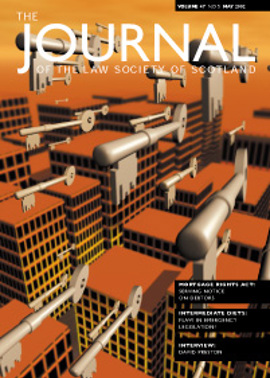In practice
MATRIMONIAL
a. Registration of Agreements in Books of Council and Session
The Committee considered the question of confidentiality in relation to documents registered in the Books of Council and Session which is a public register accessible by researchers, journalists and others. The Committee agreed that clients’ instructions should be obtained before registering agreements but recognised that in many if not most cases the arguments in favour of registration would outweigh the arguments against.
b. Breach of Contact Orders
The Committee were asked to consider the conduct of solicitors in breach of contact situations. It was suggested to the Committee that solicitors who simply intimate that their client is withdrawing contact without making any further comment and in particular without indicating that their client had been advised against doing so were acting improperly. The Committee did not agree. A solicitor’s duty is to advise his own client. Such advice is confidential and the Committee felt that whilst a client might be in breach of the Court Order there is no duty on the solicitor to do more than report the factual position to the solicitor on the other side. If in the course of proceedings to enforce a Contact Order there is evidence that a solicitor has advised the client to ignore it, and the solicitor is found in contempt of Court as a result, that would be a matter of conduct which would be the subject of a justifiable complaint.
FUNDING LITIGATION
a. Duty To Advise On Legal Aid
The Committee considered the nature of a solicitor’s duty to advise a client about Legal Aid. They agreed that the duty is to advise a client of the existence of the Legal Aid scheme (including Legal Advice & Assistance) but does not extend to a detailed consideration of whether a specific client may be eligible for Legal Aid unless the client requests such consideration and the solicitor is willing to do so. If the firm does not undertake Legal Aid work, they have a duty to make that known to prospective clients and to advise them that if they wish to apply for Legal Aid they should consult another firm of solicitors.
b. Legal Expenses Insurance
The Committee considered that legal expenses insurance and other forms of private funding are entirely different from Legal Aid. Legal Aid is a statutory right only available through the solicitor of the client. There is no duty to enquire if the client already has a legal expenses insurance policy, as it is reasonable to expect the client to bring this to the solicitor’s attention.
EXPERT WITNESS REPORTS
The Committee were concerned to receive a letter from an expert who had been asked for a report. The solicitors had asked for any adverse comments to be sent under separate cover. The Committee felt that to seek a report from an expert in these terms was improper and that the expert was entitled to seek confirmation in writing that the “good” report would not be used to mislead the other party to the matter or their agents or insurers.
MINUTE FOR RECALL OF DECREE – DEFENCE “DEBT DENIED”
The Committee considered the conduct of a solicitor putting forward a defence of “debt denied” in support of a Minute for Recall of a Decree in absence which had passed against the same firm of solicitors. The solicitors had previously acknowledged the debt, had made part payment by cheque and had offered to pay the balance within a specific period. The Sheriff complained about the solicitors conduct as he felt that the defenders were themselves officers of the Court and had stated a specific defence which was contradictory to the terms of their own letter. The Committee agreed that in relation to a Minute for Recall of Decree the solicitor had knowingly misled the Court by stating “debt denied” as a defence where he had already accepted that the debt was due and payments to account had been made.
DEBT COLLECTION – USE OF HEADED NOTEPAPER
It was held to be improper for solicitors to allow a debt collection agency to send out letters on the solicitors’ headed paper, although in this particular case the letters bore the registered office and registered number of the debt collection company. The Committee accepted the undertaking by the solicitors concerned to deal with matters themselves in future by electronic transfer of data to their own office before such letters were sent.
In this issue
- Sleeping with the enemy
- No compelling grounds for retrospective legislatio
- Serving notices under the Mortgage Rights Act
- Breaking the mould
- Karl Construction strikes again
- Lure of the law still strong
- More preparation for practitioners and sheriffs
- The Preston front
- Website reviews
- Finding, keeping, sending
- Omissions cause most claims
- In practice
- A modern way to meet
- Europe
- In and out of the Houses
- Book reviews






